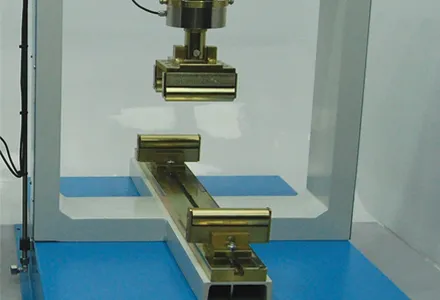UK firm Carbolite has developed a new Asphalt Binder Analyser which it says simplifies and automates calculation of the asphalt binder content of hot mix asphalts (HMAs). Traditional binder content tests use solvents to extract the binder, whereas the ABA 7/35B Asphalt Binder Analyser uses a ‘loss on ignition’ test method. “This avoids the mess and chemical waste disposal issues of traditional solvent extraction based test methods,” said Carbolite’s product manager Alan Street. The ABA 7/35B Asphalt Binder
January 3, 2013
Read time: 2 mins

UK firm 7054 Carbolite has developed a new Asphalt Binder Analyser which it says simplifies and automates calculation of the asphalt binder content of hot mix asphalts (HMAs).
Traditional binder content tests use solvents to extract the binder, whereas the ABA 7/35B Asphalt Binder Analyser uses a ‘loss on ignition’ test method. “This avoids the mess and chemical waste disposal issues of traditional solvent extraction based test methods,” said Carbolite’s product manager Alan Street.
The ABA 7/35B Asphalt Binder Analyser is compliant with the standard test methods for determining the asphalt content of HMA using the ignition method: BS EN 12697-39-2004, ASTM 6307-10 and AASHTO T308-10.
The ABA 7/35B’s has an intuitive touch screen interface which can be used when wearing gloves, with English, French, Spanish, Italian, Chinese (simplified Mandarin) and Russian languages as standard. Test recipes are easily stored, recalled and transferred between furnaces.
During the test process the door is locked whilst the sample ignites and burns and then releases with a ‘test finished’ alarm when testing is complete. Logging test results is easy and multiple test methods / recipes can be stored.
Traditional binder content tests use solvents to extract the binder, whereas the ABA 7/35B Asphalt Binder Analyser uses a ‘loss on ignition’ test method. “This avoids the mess and chemical waste disposal issues of traditional solvent extraction based test methods,” said Carbolite’s product manager Alan Street.
The ABA 7/35B Asphalt Binder Analyser is compliant with the standard test methods for determining the asphalt content of HMA using the ignition method: BS EN 12697-39-2004, ASTM 6307-10 and AASHTO T308-10.
The ABA 7/35B’s has an intuitive touch screen interface which can be used when wearing gloves, with English, French, Spanish, Italian, Chinese (simplified Mandarin) and Russian languages as standard. Test recipes are easily stored, recalled and transferred between furnaces.
During the test process the door is locked whilst the sample ignites and burns and then releases with a ‘test finished’ alarm when testing is complete. Logging test results is easy and multiple test methods / recipes can be stored.








